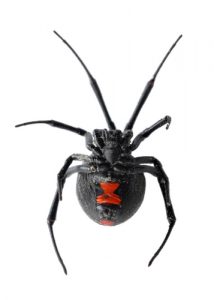Are Spiders Good Guys?
By Chris Williams on September 9, 2011.
Q. My wife is scared to death of spiders. I keep telling her that spiders are beneficial, that they kill other bugs and that we should just leave them alone. She’s not buying it. She’s deathly afraid of getting bitten by a spider. I tell her the spiders are not really interested in biting her. Can you confirm that?
A. Well, I don’t know your wife personally but yes, I’m pretty sure that spiders are not looking to bite her. It may not be enough to cure your wife’s arachnophobia, but the fact is that spider bites are actually quite rare. Spiders get a bad rap. A 1988 survey showed that 80% of suspected spider bites were actually caused by other arthropods or were instead the symptoms of a disease. Bite symptoms are so similar that doctors often take a patient’s word for it if she says she thinks she was bitten by a spider. A spider won’t bite except under duress; you have to step on it, roll on it, smash it, or otherwise threaten it or cause it bodily harm. A spider bite is self defense.
 There are many different types of spiders but all spiders feed on live prey, mostly insects and other arthropods. They hunt their prey by directly attacking them (jumping spiders) or by building webs that ensnare them. Yes, they are considered highly beneficial because their voracious appetites keep damaging pests in check. Spiders of course, don’t actually discriminate about who they eat and will eat beneficial insects (and sometimes each other) as well. But overall, the elimination of the bad outweighs the loss of the good.
There are many different types of spiders but all spiders feed on live prey, mostly insects and other arthropods. They hunt their prey by directly attacking them (jumping spiders) or by building webs that ensnare them. Yes, they are considered highly beneficial because their voracious appetites keep damaging pests in check. Spiders of course, don’t actually discriminate about who they eat and will eat beneficial insects (and sometimes each other) as well. But overall, the elimination of the bad outweighs the loss of the good.
Spiders are most often found in quiet, dark locations – not just because they want to avoid people (they do) but because that is where their prey is hanging out. Every home has a few spiders but if you have a lot of spiders in your home, you must have enough other insects in your home to support the spider population. That could be your real problem.
On the rare occasions when a spider bites a person, it injects the same venom that it uses to kill or paralyze its prey. People react differently to a spider’s venom but the bite of a nonpoisonous spider generally results in one or all of these symptoms: redness, minor swelling, localized pain, and itching – symptoms like most other bites from other arthropods. A spider’s bite leaves two small puncture marks from the fangs as opposed to a single puncture from an insect bite.
Actually, our one truly poisonous spider in the Northeast is probably even more shy than other spiders. A black widow spider does have a neurotoxic venom that can be life threatening, but again it is only going to bite if it is accidentally touched. Fortunately, black widow spiders are not often found inside homes and are easily recognized by the red hourglass shape on their abdomen. Black widows are most common outside in firewood piles, under dense shrubbery, in debris piles, and in undisturbed boxes and clutter in garages and sheds. The brown recluse spider, the other poisonous spider that you sometimes hear about in the news, does not occur naturally in our area.
Your wife is certainly not alone in her fear of spiders. Spiders are one of the two most feared creatures on earth (the other being snakes). Some people can happily live with spiders; others just can’t. That’s why Colonial has a Spider Management Program as part of our pest control services!